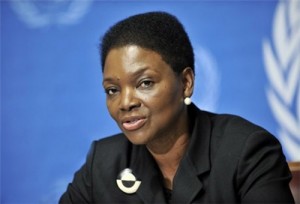 The UN humanitarian affairs chief has expressed deep concern for communities cut off in Syria by months of fighting between government and rebel forces.
The UN humanitarian affairs chief has expressed deep concern for communities cut off in Syria by months of fighting between government and rebel forces.Valerie Amos�told the BBC she had heard accounts of near starvation, including in the capital, Damascus.
Baroness Amos, who is in Syria, said she had spoken to the government about trying to get humanitarian access.
She said the situation in the country was getting worse by the day and she had heard horrific tales of suffering.
The situation on the ground keeps shifting, but a confidential UN document leaked to the BBC in late December said more than a quarter of a million Syrians are stuck in "besieged or hard to access areas".
Starving an area is a war crime. In Syria, food is a weapon of war used by all sides as they try to gain ground militarily, says the BBC's Lyse Doucet.
The uprising began in March 2011 and the UN says more than 100,000 people have died in the conflict.
Her visit comes less than two weeks before the planned start of an international conference in Switzerland to find a political solution to the war.
Foreign ministers from 11 countries that back the Syrian opposition movement are meeting in Paris - with the aim to persuade the opposition to attend the Geneva II talks.
British Foreign Secretary William Hague said the meeting would be "very difficult" but the case for the opposition's attendance was "very strong" and "would put the regime on the spot".
The Syrian National Coalition asserts President Bashar al-Assad has no intention of negotiating his own departure, especially now that the military opposition is itself compromised by the rise of Islamist groups.
There is an almost complete disconnect between the effective forces on the ground inside the country, and the Western-backed Coalition - which claims to be the sole representative of the Syrian people, says BBC Middle East correspondent Jim Muir.
'Unimaginable'
Baroness Amos said she was "really worried" about people in communities who had been besieged for long periods, in some cases for more than a year.
"The sick and wounded have not been able to leave, we've not been able to get food in.
"There are reports of people on the brink of starvation including in the Yarmouk Palestinian refugee camp close to the centre of Damascus," she told the BBC.
She described the situation as "unimaginable".
She said the Syrian government had given assurances that they would help the UN to get humanitarian access.
"We talked in particular about how we can try to get into these besieged communities - this has been part of the conversations that I've had with the government on a number of occasions.
"I have been assured by the deputy foreign minister and also by the foreign minister that the government will do everything that they can to help us to facilitate that access."
Speaking on Friday, UN official Christopher Gunness said residents in the Yarmouk camp, including infants and children, have been subsisting on diets of such things as stale vegetables, animal feed and cooking spices dissolved in water.
He said infants were suffering from diseases linked to severe malnutrition, including anaemia, rickets, and kwashiorkor [a protein deficiency].
The Syrian Observatory said separately that it had documented the deaths of 41 Palestinian refugees as a result of food and medical shortages in the past three months.
By BBC
The Iran Project is not responsible for the content of quoted articles.










